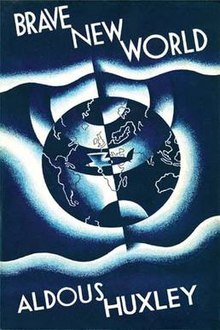Brave New World by Aldous Huxley
O, wonder! How many goodly creatures are there here How beauteous mankind is! O brave new world, that has such people in’t!
— William Shakespeare, The Tempest

In a perfect future everyone is genetically engineered to know their place in a caste system, every want or need is catered for, and if a citizen is ever feeling down, soma is there to take them on a holiday. Though in this bright imagining of the world where even death is no big deal, fractures form in the perfect facade with the elimination of free will, love, and family in the name of the betterment of society. In Brave New World Aldous Huxley goes in a different direction from the normally grim, brutal, dystopian future towards something that is still in our eyes fundamentally wrong.
Bombarded with new terms, scientific exposition, and radical concepts from chapter one, I found it difficult at first to find my rythm with this book. It was not until the story of one of the main characters, Bernard Marx, started to develop that the story really found an anchor point for me. Bernard is slightly off. He doesn’t enjoy group sports or community sings, and would rather go steady with a single girl rather than have sex with as many partners as possible as conditioning would normally dictate. These traits alone are enough to make him an outcast in his high Alpha caste. In a way he is like Winston in 1984, in that he knows that mankind once lived differently, and longs to find out what is missing deep inside.
Bernard eventually starts seeing Lenina, who fits perfectly into conditioned society in ways that Bernard never could, and is shocked and confused by any slight deviation from the norm. The novel begins to pick up steam when the two of them decide to take a trip to a Savage Reservation, which Bernard is privileged to do because of his position as a psychologist.
In the Savage Reservation the two of them are exposed to squalor and hardship for the first time in their lives in an Indian community at Malpais. Witnessing the perverse sight of mothers and children is almost too much for Lenina to bear, though the pair accidentally leave their soma back at their cabin on the outskirts of the reservation, so their is no escape from reality. It is at Malpais that they decide to bring back a savage born from a civilized mother, who was left in the reservation on a visit similar to Bernard and Lenina’s, so he can witness the world outside.
I won’t go on because I feat I will spoil too much, but the parts in Malpais and the savage’s witnessing of the brave new world in a stranger-in-a-strange-land scenario are where the novel drives its well-crafted points home.
One could make comparisons with 1984, it being a similar novel about a totalitarian state in a dystopian future. What differs is the execution. Orwell crafts a bleak and depressing world where there is constant war, or at least the illusion of it, forced hardship, lack of resources, ceaseless and pointless production, and constant surveillance. Huxley’s future, however, is almost utopian in comparison. No one is ever wanting for food, water, or shelter, drugs are distributed freely, there are endless leisure activities and unrestricted sexuality and polygamy that is encouraged as a healthy and necessary practice.
The scariest part about Brave New World is that the citizens do not want things to be different. They are genetically and psychologically conditioned from before birth to accept their lot in the caste system and be utterly incapable of free thought or understanding what it means to be in a different caste. Or, more accurately, they have free thought and will but it does not matter. Everyone’s lives are so cushy and correct in their own minds that it would be impossible to form any kind of organised resistance. The government expects this, and have ways of dealing with rogues in a much less brutal fashion than 1984.
It is terribly prescient and predictive for a novel written in 1931 and highlights different dangers of a dystopian future than 1984. There is beauty in its perfection and scientific triumph, and the idea of happiness and world peace is not entirely unattractive. It is the complete removal of love and the bonds of family that is the most disturbing part of this vision of the future, where individualism is looked down upon. Though if you ever get unhappy, there is always soma!